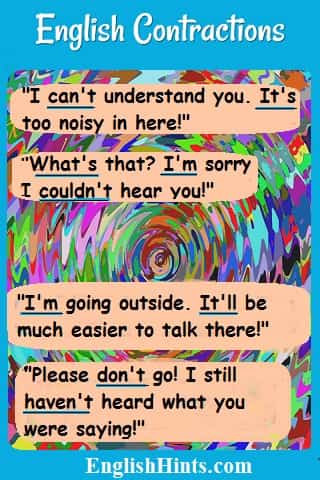English Contractions: Important-- & Difficult
English contractions are very common in everyday speech. We use them to save time and to show we’re on informal, friendly terms with the person or people we are talking to.
Speech without contractions sounds too formal to most English speakers. It seems stiff or “stuck up," as if the person speaking feels superior.
But contractions are uncommon, and often unacceptable, in formal writing. (That includes business proposals and most academic writing like essays or term papers.)
English contractions can be hard to understand when you fist listen to English. In the U.S. you might hear two young people saying
“Dija see Sally at the game?”
“Nah, she must’ve bin sick—or she kuda gone out with Bill instead. Hey—gotta go now. Seeya soon!”
In correct written English, that would have been: “Did you see Sally at the game?” “No. She must have been sick, or she could have gone out with Bill instead. Hey, (I’ve) got to go now. (I’ll) see you soon!”
For more examples, see (and listen to) this short Voice of America talk. It suggests ways to listen better to everyday conversations. It can help you recognize the grammar you've learned in what people say.
Examples of Common English Contractions
This mock-rap video lists positive contractions. (It might not show on a mobile phone. Most screens are too small.) For his Negative Contraction list see Negative Sentences. It's a funny rap on a bad relationship.
You may have noticed that many contractions have two or more possible meanings. He's= he is OR he has; she'd= she had OR she would, etc. That doesn't bother English speakers because the meaning is usually clear (at least to us!) from the context.
Examples:
- She's going to the park= she is going (is+ present participle with -ing)
- She's finished dinner = she has finished (has + past participle with -ed)
- "I'd go with you if I could" has to mean "I would go with you." (modal + base form of main verb)
- "I'd already gone three times" has to mean "I had already gone" since the following (main) verb is a past participle.
Other contractions are easier. The examples below give the same expression without a contraction in parentheses. (Modals are first, then ‘be’ and the helping verbs ‘have’ and ‘do’)
- “Do you think she’ll go with us?” (…she will)
- “No. She won’t want to leave Tommy alone.” (She will not…)
- “I can’t go, but I wouldn’t even if I could!” (I cannot go, but I would not…)
- “You should’ve told me you knew!” (You should have…—often pronounced ‘should of’ or even ‘shuda.’)
- “Bill isn’t interested, and I’m not either.” (Bill is not… I am not.) You could also say “Bill’s not interested…” That still means Bill is not interested.
- "Sue wasn’t tired after working all afternoon, but her brothers were exhausted. I think they weren’t in good shape. They hadn’t been exercising the way Sue had!” (Sue was not… they were not… They had not been exercising.)
- “Don’t you like ice cream?” “No, I think it’s too sweet. Sam doesn’t like it either.” (Do you not like ice cream?... it is too sweet. Sam does not like it either.)
Incidentally, we almost never say ‘Do you not?’ We would always ask: ‘don’t you…?’
For more examples, see
- Negative Sentences,
- The Verb 'to Be' (be+ main verb ending in -ing for the present continuous tense),
- Modal Verbs (Notice that 'would' is followed by the base form of the main verb),
- and Past & Present Perfect Tense Use (Notice that the past perfect helping verb 'had' is followed by a past participle.)
Home> English Grammar Lessons > English Contractions
Didn't find what you
needed? Explain what you want in the search box below.
(For example, cognates, past tense practice, or 'get along with.') Click to see the related pages on EnglishHints.
| site search by freefind | advanced |






